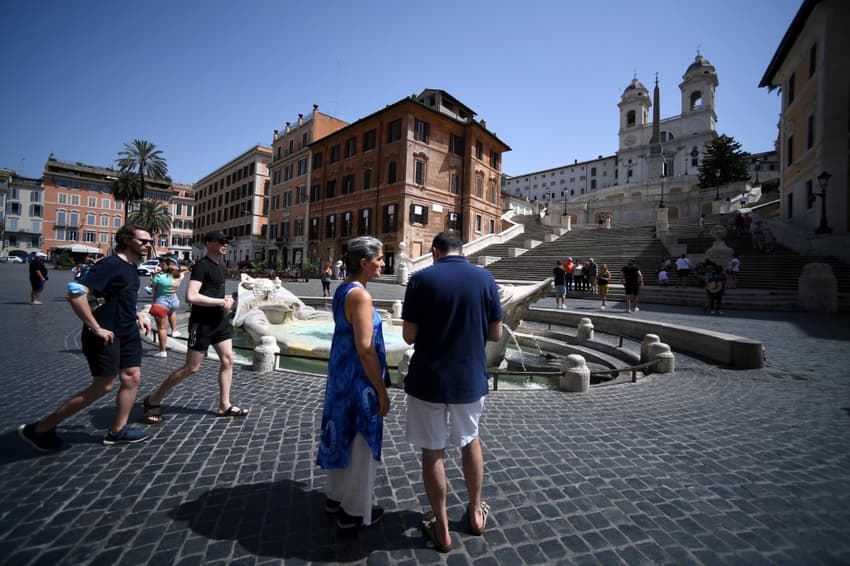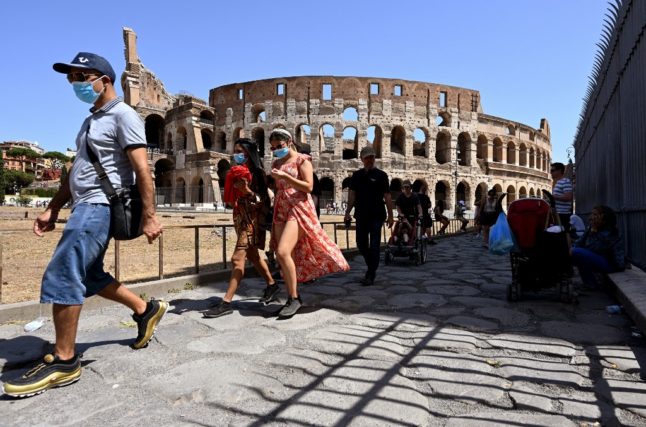At a glance: What are the Covid-19 rules in Italy now?

Italy has had very few pandemic-related health restrictions in place over summer, but there are still some rules to be aware of.
After years of frequently changing health measures in Italy, it can be hard to keep up with exactly what rules are in place.
For the first time in a long time, Italy has had almost no Covid restrictions in place this summer.
But, as the Italian health ministry remains cautious about managing the pandemic, there are still a couple of rules you'll need to be aware of.
It's not known whether or how any of these rules may change by autumn. This will no doubt depend on the agenda of the country's new government following elections on September 25th.
But if you're planning to visit Italy soon, here's a quick guide to what you can expect.
Travel to and within Italy
Travel to Italy for any reason, including tourism, is currently allowed from all countries.
As of June 1st, Italy has scrapped the requirement to show proof of coronavirus vaccination, recent recovery or a negative test result in order to enter the country.
This was the last remaining Covid-related rule in place for travellers to Italy, after the requirement for arrivals to complete an EU digital passenger locator form (dPLF) was lifted on May 1st.
Masks
Italy's government on June 15th lifted its mask mandate for almost all public places.
However, higher-grade FFP2 masks remain a requirement on all forms of public transport, except for flights (both domestic and international) under rules which will stay in place until at least the end of September.
It's hard to say whether the rules will be extended after that date. It will all depend on Italy's new government: early elections have been called for September 25th.
Masks also remain obligatory in hospitals, care homes and all other types of healthcare facilities.
Anyone refusing to comply with the rules can still face a fine of 400 euros.
READ ALSO: Why are so many Italians still wearing face masks in shops?
Though it's no longer a requirement, the government continues to advise people to wear masks in all crowded areas, including outdoors.
Private businesses and individual venues, including galleries and museums, may also impose their own mask mandates.
 Mask rules have been eased in Italy except for on public transport - though they remain recommended in crowded places. Photo by Vincenzo PINTO / AFP
Mask rules have been eased in Italy except for on public transport - though they remain recommended in crowded places. Photo by Vincenzo PINTO / AFP
Quarantine rules
Italy still requires anyone who tests positive for coronavirus while in the country to self-isolate. The minimum period was cut in early September.
The health ministry’s updated rules state that anyone who tests positive while in Italy is required to immediately self-isolate for a minimum of seven days – if they’re fully vaccinated or recently recovered from Covid.
The infected person must have been symptomless for at least two days in order to exit quarantine (with the exception of symptoms relating to a lost sense of taste or smell).
The patient must also test negative for the virus via either a molecular (PCR) or rapid antigen test on the final day of the quarantine in order to be allowed out.
Quarantined people who keep testing positive for the virus can be kept in self-isolation for a maximum of 14 days.
Read more about getting tested for coronavirus while in Italy in a separate article here.

Photo by FILIPPO MONTEFORTE / AFP
Green passes
Italy no longer requires people to show proof of vaccination, recovery or a recent negative test result under the 'green pass' system which was in place last summer.
That means you'll no longer need to show any form of health certificate in order to eat in a restaurant, visit museums, stay in a hotel, or use public transport.
However, if you end up visiting a hospital you will need to show proof of vaccination or recovery, or of a negative test result within the past 48 hours.
You won't need an Italian green pass if you’re just visiting; Italy recognises proof of vaccination or recovery issued abroad as equivalent, providing it meets certain requirements.
Other restrictions
Italy no longer has any restrictions in place on business opening times or capacity.
Within Italy, there are no restrictions on travel and movement between regions under current rules set by the national government, though local authorities can impose their own measures at any time.
Note that local authorities and individual businesses in Italy can still set different rules than those at the national level, meaning certain rules may continue to vary from one place to another.
Italy's health authorities continue to recommend precautions including social distancing and frequent hand-washing.
For more information about how the rules may apply to you, see the Italian health ministry’s website or consult the Italian embassy in your country.
Comments
See Also
After years of frequently changing health measures in Italy, it can be hard to keep up with exactly what rules are in place.
For the first time in a long time, Italy has had almost no Covid restrictions in place this summer.
But, as the Italian health ministry remains cautious about managing the pandemic, there are still a couple of rules you'll need to be aware of.
It's not known whether or how any of these rules may change by autumn. This will no doubt depend on the agenda of the country's new government following elections on September 25th.
But if you're planning to visit Italy soon, here's a quick guide to what you can expect.
Travel to and within Italy
Travel to Italy for any reason, including tourism, is currently allowed from all countries.
As of June 1st, Italy has scrapped the requirement to show proof of coronavirus vaccination, recent recovery or a negative test result in order to enter the country.
This was the last remaining Covid-related rule in place for travellers to Italy, after the requirement for arrivals to complete an EU digital passenger locator form (dPLF) was lifted on May 1st.
Masks
Italy's government on June 15th lifted its mask mandate for almost all public places.
However, higher-grade FFP2 masks remain a requirement on all forms of public transport, except for flights (both domestic and international) under rules which will stay in place until at least the end of September.
It's hard to say whether the rules will be extended after that date. It will all depend on Italy's new government: early elections have been called for September 25th.
Masks also remain obligatory in hospitals, care homes and all other types of healthcare facilities.
Anyone refusing to comply with the rules can still face a fine of 400 euros.
READ ALSO: Why are so many Italians still wearing face masks in shops?
Though it's no longer a requirement, the government continues to advise people to wear masks in all crowded areas, including outdoors.
Private businesses and individual venues, including galleries and museums, may also impose their own mask mandates.

Quarantine rules
Italy still requires anyone who tests positive for coronavirus while in the country to self-isolate. The minimum period was cut in early September.
The health ministry’s updated rules state that anyone who tests positive while in Italy is required to immediately self-isolate for a minimum of seven days – if they’re fully vaccinated or recently recovered from Covid.
The infected person must have been symptomless for at least two days in order to exit quarantine (with the exception of symptoms relating to a lost sense of taste or smell).
The patient must also test negative for the virus via either a molecular (PCR) or rapid antigen test on the final day of the quarantine in order to be allowed out.
Quarantined people who keep testing positive for the virus can be kept in self-isolation for a maximum of 14 days.
Read more about getting tested for coronavirus while in Italy in a separate article here.

Green passes
Italy no longer requires people to show proof of vaccination, recovery or a recent negative test result under the 'green pass' system which was in place last summer.
Other restrictions
Italy no longer has any restrictions in place on business opening times or capacity.
Within Italy, there are no restrictions on travel and movement between regions under current rules set by the national government, though local authorities can impose their own measures at any time.
Note that local authorities and individual businesses in Italy can still set different rules than those at the national level, meaning certain rules may continue to vary from one place to another.
Italy's health authorities continue to recommend precautions including social distancing and frequent hand-washing.
For more information about how the rules may apply to you, see the Italian health ministry’s website or consult the Italian embassy in your country.
Join the conversation in our comments section below. Share your own views and experience and if you have a question or suggestion for our journalists then email us at [email protected].
Please keep comments civil, constructive and on topic – and make sure to read our terms of use before getting involved.
Please log in here to leave a comment.